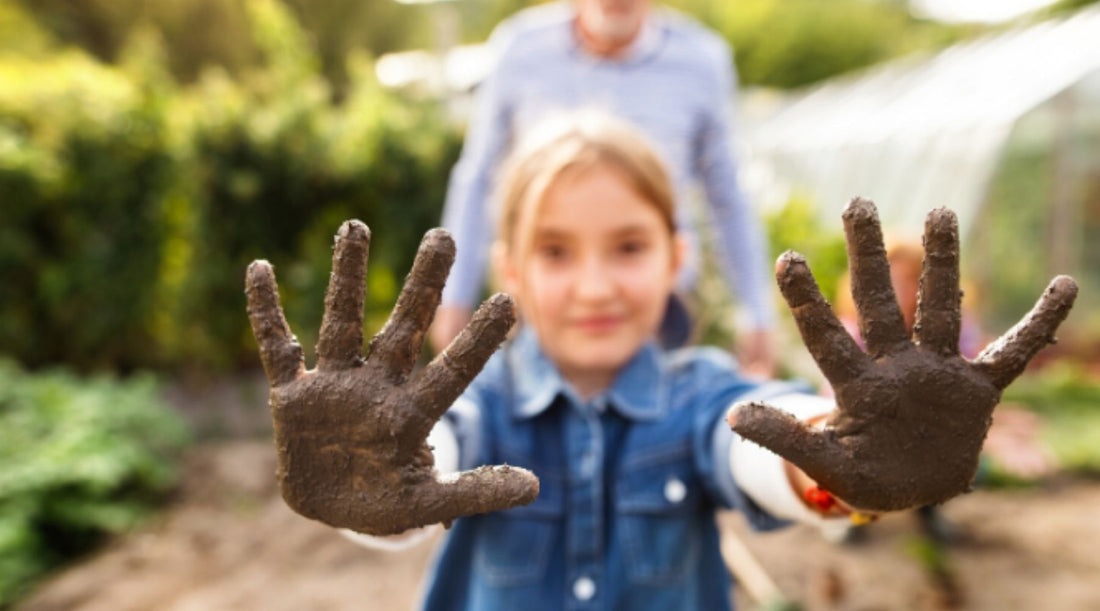If you are blessed enough to have a yard, chances are you probably have a garden. Whether it’s planting beautiful and colorful flowers or growing your own food, time outside and hands in soil is something we all look forward to from time to time.
Just as gardening has its benefits on you it has the same, if not greater, benefits for your kids. Continue reading and learn more about why you should encourage your children to join you out in the yard next time.
It Encourages Calm Behavior & Other Therapeutic Benefits
Having quiet time outdoors and performing repetitive tasks allows time for reflection and connectedness. In the current digital age, it’s more important now than ever to connect with soil doing activities such as digging and planting. Planning a garden, planting seeds and watching them grow gives kids a sense of purpose and responsibility. Tending to seeds in a raised garden bed regularly fosters mindfulness and awareness. Studies show gardening contributes in improved moods, better learning experiences and decreased anxiety levels among children. Therapeutic gardening for kids has specifically shown great promise as an effective way to help combat behavioral issues and to improve the self-esteem of children. When it comes to the improvement of behavioral problems and gardening, many tiny growers are able to foster feelings of calmness and achievement. It is believed that gardening for behavioral disorders can build self-confidence in children, as the planting and care for the growing space will require both accountability and a sense of ownership. In addition to these positive attributes, gardening as therapy for children can help to fight mental issues, as well as establish life habits that promote health and wellness. Furthermore, the lessons learned while performing gardening activities such as using food scarps for fertilizer and collecting rainwater, teach kids deep respect and responsibility for our planet.
It Aids with Development
Children’s gardening is a wonderful physical and sensory development activity. Young children can practice locomotor skills, body management skills and object control skills while they move from one place to the other carrying tools, soil, and water. While they are helping, they will be using large muscles and using muscles to balance and manage objects too. Fine motor skills also play a big role in gardening when children use certain tools and pick up tiny seeds to plant. Sensory stimulation is experienced during the gardening process by seeing the different colors of the flowers and/or fruits and vegetables, smelling the different scents, and feeling different textures all around.
Cognitive development is all about intellectual skills such as remembering and analyzing information and predicting outcomes. There is plenty of that in children’s gardening. By asking open-ended questions about what you have already done in your garden and what they think you should do next, you are helping them think through the processes of preparing the soil, planting, watering and weeding. Ask them to tell you about the differences between the various plants you are growing or the different parts of the plants themselves. Show them the entire plant—roots, stem, leaves, flowers and seeds—or let them draw the plant at different stages of growth.
Finally, working together on your garden with your children is togetherness time. You build bonds with children and create memories from your experiences in the garden. While your children are learning a lifelong love of growing things, you are learning more about your children—how they think, what they like and dislike and how capable they really are. Your plants can create a beautiful environment, whether they are in a garden, a raised garden bed or a pot, and you and your children will enjoy every stage of the process.
It Teaches Them About How & Where Their Food Comes From
Gardens are a great way to get children to learn about nutrition by helping them make the connection between growing food and proper diets. Using raised garden beds and/or patio plant towers (for those without outdoor space) to grow vegetables, fruits or herbs is the place to start. Studies show that kids who are hands-on in a garden result in kids who eat up to three times more fruits and vegetables regardless of whether or not that food was grown in the garden. Furthermore, having time outside and observing the different bugs in the soil is a great way to learn more about the environment and the connection between how one thing affects another. The wonder of seeing a garden grow may spark your kids to ask questions like: Why do the plants need sun? How does the plant “drink” water? Why are worms good for the plants? Soon you will be talking about soil composition, photosynthesis and more!
This time can be used for more educational purposes, as well. You can add a little math while gardening by measuring how much plants are growing from week to week or counting the flowers on each plant. Supplement the experience of gardening with books about plants, trips to a botanical garden, or a photo journal of the plants that you are growing.
Do not let the idea overwhelm you! Gardening does not require a perfectly level, large or sunny backyard. Try planting in a small raised garden bed or growing a few edibles in existing landscaping. Lean a trellis against an outside wall to grow beans or other edible vines. If you do not have a lot of outdoor space, there are simple solutions for that as well! Any sunny spot can be an easy way to grow herbs or some sweet cherry tomatoes that kids will not be able to resist. Plants like zucchini, tomatoes, cucumbers, radishes, and herbs are fairly easy to grow without a lot of fuss, making them a great return on your investment.
Enjoy quality time together, as a family, and try something new. Get in the garden today and start digging – it’s good for the mind and soul.

